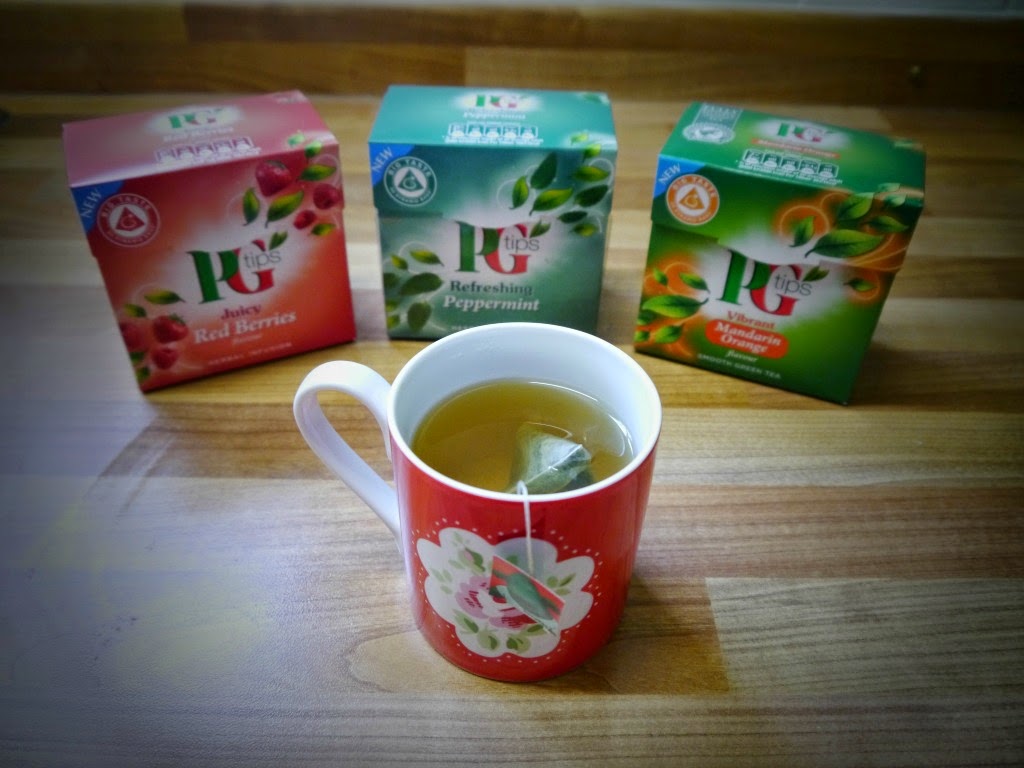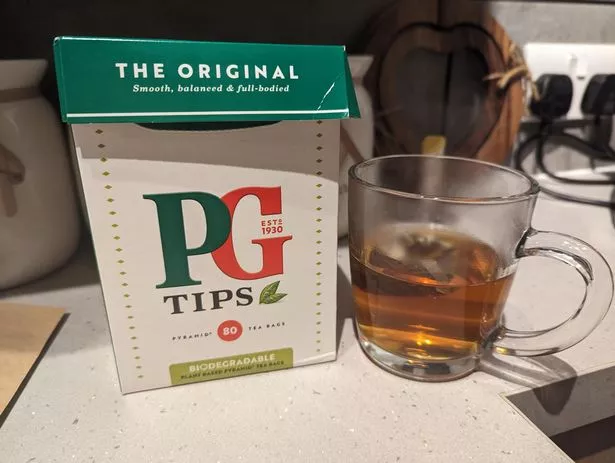Yes, PG Tips tea has caffeine. How much can change based on the kind of tea and how you make it. Black tea, like PG Tips, usually has more caffeine than green or herbal teas.
Caffeine is a natural thing in tea leaves that gives tea its taste and can make you feel more awake. If you’re careful about how much caffeine you have or if it affects you a lot, it’s a good idea to check the label or look up the caffeine amount in the kind of PG Tips you like. This way, you can choose the tea that fits what you want and need.
Why do people care about the caffeine content in tea?

People care about the caffeine content in tea for a few reasons. First, caffeine is a natural stimulant that can make you feel more awake and alert. Some people enjoy this boost, especially in the morning or when they need a pick-me-up.
However, others may be more sensitive to caffeine and want to manage their intake to avoid feeling jittery or having trouble sleeping.
Additionally, some choose low-caffeine or caffeine-free teas for health reasons or personal preferences.
Being aware of the caffeine content helps individuals make informed choices that align with their energy needs, sensitivities, and overall well-being.
What makes PG Tips tea unique?
PG Tips tea is known for several characteristics that make it unique and distinguish it in the world of tea:
Blend of Teas:
PG Tips is a blend of various teas, primarily Assam, Ceylon, and Kenyan. This combination imparts a robust and full-bodied flavor to the tea.
Pyramid-shaped Tea Bags:
One distinctive feature of PG Tips is its pyramid-shaped tea bags. This design allows more room for the tea leaves to move, enhancing the infusion process and contributing to a richer flavor.
Strong and Refreshing Flavor:
PG Tips is renowned for its strong and invigorating taste. It’s a favorite among those who prefer a bold cup of tea that can stand up well to milk and other additions.
Heritage and Tradition:
PG Tips has a long history, dating back to 1930. Its heritage and tradition are part of what makes it a beloved and iconic tea brand in the United Kingdom.
Sustainable Practices:
The brand has also taken steps toward sustainability. PG Tips has committed to sourcing tea from Rainforest Alliance Certified™ farms, promoting ethical and environmentally friendly practices.
Widely Recognized Brand:
PG Tips has gained widespread recognition and popularity, becoming a household name in the UK and beyond. Its distinctive packaging and advertising campaigns have contributed to its iconic status.
Versatility:
Whether enjoyed on its own or customized with milk, sugar, or other additions, PG Tips is known for its versatility. It accommodates various preferences, making it a versatile choice for tea enthusiasts.
How much caffeine is typically found in tea?
The caffeine content in tea can vary based on factors like the type of tea and how it’s prepared.
Black Tea:
Content: Black tea generally contains the highest caffeine levels among true teas. The range is approximately 40 to 70 milligrams of caffeine per 8-ounce cup.
Processing: The leaves of black tea undergo full oxidation, resulting in a robust flavor and higher caffeine content.
Green Tea:
Content: Green tea contains a moderate amount of caffeine, ranging from about 20 to 45 milligrams per 8-ounce cup.
Processing: Green tea undergoes minimal oxidation, preserving more natural compounds and a lighter flavor compared to black tea.
White Tea:
Content: White tea generally has the least caffeine, ranging from 15 to 30 milligrams per 8-ounce cup.
Processing: White tea is the least processed of the true teas. It consists of young tea leaves and buds that are minimally oxidized.
Herbal Teas:
Content: Herbal teas, technically not true teas, are often caffeine-free. However, certain herbal blends may include ingredients with natural caffeine, such as yerba mate, guayusa, or specific herbs.
Variety: Since herbal teas can encompass a wide array of plants and botanicals, caffeine levels vary widely. It’s crucial to check the specific ingredients in herbal blends if you’re looking for a caffeine-free option.
Decaffeinated Teas:
Content: Decaffeinated teas are processed to remove most of the caffeine, but trace amounts may remain. The exact caffeine content in decaffeinated teas varies based on the method of decaffeination.
What are the potential health effects of tea caffeine?
Tea caffeine can have various potential health effects, both positive and negative. Here’s a breakdown:
Positive Health Effects:
Mental Alertness:
Caffeine, a natural stimulant, can help improve alertness, concentration, and cognitive function. Many people enjoy tea for its mild stimulating effects.
Antioxidant Properties:
Tea, including black and green tea, contains antioxidants such as catechins and polyphenols. These compounds may help neutralize harmful free radicals in the body, contributing to overall health.
Mood Enhancement:
Caffeine can have a positive impact on mood by stimulating the release of neurotransmitters like dopamine and serotonin, contributing to a sense of well-being.
Metabolic Boost:
Caffeine has been shown to increase metabolic rate and enhance fat burning. Some individuals consume tea as part of their weight management or fitness routines.
Negative Health Effects:
Insomnia and Disrupted Sleep:
Caffeine, if consumed in excessive amounts or too late in the day, can interfere with sleep patterns and contribute to insomnia. It’s advisable to limit tea intake, especially in the evening.
Increased Heart Rate and Blood Pressure:
In some individuals, caffeine can lead to a temporary increase in heart rate and blood pressure. Those with cardiovascular concerns may need to monitor their caffeine intake.
Digestive Issues:
Excessive caffeine consumption can lead to digestive issues such as acid reflux or stomach discomfort in some individuals.
Dependency and Withdrawal:
Regular consumption of caffeine can lead to dependency, and abrupt cessation may result in withdrawal symptoms like headaches, irritability, and fatigue.
Pregnancy Concerns:
Pregnant individuals are often advised to limit caffeine intake due to potential associations with adverse pregnancy outcomes. It’s crucial for expectant mothers to consult with healthcare professionals for personalized guidance.
Moderation and Individual Variability:
Moderation is Key:
Enjoying tea in moderation is generally considered safe for most individuals. Moderate caffeine intake is often defined as 200-400 milligrams per day, but individual tolerance can vary.
Individual Sensitivity:
People react differently to caffeine. Some individuals are more sensitive and may experience side effects even with lower amounts, while others can tolerate higher doses without issues.
Personalized Choices:
It’s essential to make tea consumption choices based on individual health conditions, sensitivity to caffeine, and overall well-being.
How can you check the caffeine content in tea?

To find out how much caffeine is in your tea, you can start by looking at the label on the tea package. Many tea brands mention the caffeine content there.
If that information isn’t available, you can check online resources like websites or databases that provide details about caffeine levels in different teas.
Another way is to contact the tea company directly; they often have customer service that can help. Some people also use caffeine testing strips, which give a rough estimate of caffeine.
Remember, adjusting how you make your tea, like changing the water temperature or brewing time, can also affect its caffeine content. Keep in mind that different types of tea, such as black or green tea, may have varying caffeine amounts.
FAQ
Is drinking PG Tips good for you?
Drinking PG Tips can be part of a healthy lifestyle when consumed in moderation. While it offers a robust tea experience, excessive tea consumption should be avoided to maintain overall well-being.
What ingredients are in PG Tips tea?
PG Tips tea typically includes a blend of black teas, such as Assam, Ceylon, and Kenyan. These ingredients contribute to the tea’s distinctive flavor and character.
Is PG Tips black tea?
Yes, PG Tips is primarily a black tea blend. It is well-known for its robust and full-bodied flavor, characteristic of traditional black teas.
Is PG Tips tea decaffeinated?
PG Tips offers decaffeinated options for those who prefer tea without caffeine. Decaffeinated versions go through a process to reduce caffeine levels while preserving the tea’s flavor.
Do PG tea bags have caffeine?
Yes, regular PG Tips tea bags contain caffeine, as they are made from a blend of black teas. The caffeine content may vary based on factors like brewing time and water temperature.
Which tea bag has no caffeine?
Decaffeinated tea bags, such as those labeled as “PG Tips Decaffeinated,” are designed for individuals seeking a tea experience without the stimulating effects of caffeine.
Is 46 mg of caffeine a lot?
The caffeine content considered “a lot” varies among individuals. For many, 46 mg is a moderate amount and is roughly equivalent to the caffeine in a standard 8-ounce cup of black tea.
Is tea caffeine-free?
Not all teas are caffeine-free. While herbal teas are generally caffeine-free, true teas, like black and green tea, naturally contain caffeine. Decaffeinated options are available for those looking to reduce caffeine intake.
Final words
Yes, PG Tips tea does have caffeine, especially in its original black tea blend. It’s important to be aware of this if you’re sensitive to caffeine. However, if you enjoy the robust flavor and the natural pick-me-up, PG Tips can be a delightful choice. Remember, there are also decaffeinated options available if you prefer less caffeine. So, whether you’re a tea enthusiast seeking a morning boost or someone looking for a milder option, PG Tips offers a variety to suit different tastes. Just check the label or the brand’s information to find the perfect cup for you!
